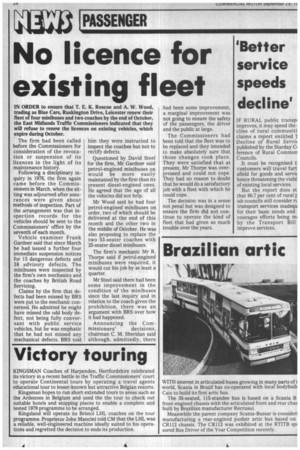No licence for existing fleet
Page 26

If you've noticed an error in this article please click here to report it so we can fix it.
IN ORDER to ensure that T. E. K. Roscoe and A. W. Wood, trading as Blue Cars, Ruskington Drive, Leicester renew their fleet of four minibuses and two coaches by the end of October, the East Midlands Traffic Commissioners indicated that they will refuse to renew the licences on existing vehicles, which expire during October.
The firm had been called before the Commissioners for consideration of the revocation or suspension of its licences in the light of its maintenance history.
Following a disciplinary inquiry in 1976, the firm again came before the Commissioners in March, when the sitting was adjourned after assurances were given about methods of inspection. Part of the arrangement was that inspection records for the vehicles should be sent to the Commissioners' office by the seventh of each month.
Vehicle examiner Frank Gardner said that since March he had issued a further four immediate suspension notices for 13 dangerous defects and 38 advisory defects. The minibuses were inspected by the firm's own mechanics and the coaches by British Road Servicing.
Claims by the firm that defects had been missed by BRS were put to the mechanic concerned. He admitted he might have missed the odd body defect, not being fully conversant with public service vehicles, but he was emphatic that he had not missed any mechanical defects. BRS told_ him they were instructed to inspect the coaches but not to rectify defects.
Questioned by David Steel for the firm, Mr Gardner said petrol-engined minibuses on would be more easily maintained by the firm than its present diesel-engined ones. He agreed that the age of all the vehicles did not help.
Mr Wood said he had four petrol-engined minibuses on order, two of which should be delivered at the end of this month and the other two in the middle of October. He was also proposing to replace the two 53-seater coaches with 25-seater diesel minibuses.
The firm's mechanic Mr R. Thorpe said if petrol-engined minibuses were required, it would cut his job by at least a quarter.
Mr Steel said there had been some improvement in the condition of the minibuses since the last inquiry and in relation to the coach given the prohibition, there was an argument with BRS over how it had happened.
. Announcing the Com missioners' decisions, chairman C. M. Sheridan said . although, admittedly, there had been some improvement, a marginal improvement was not going to ensure the safety of the passengers, the driver and the public at large.
The Commissioners had been told that the fleet was to be replaced and they intended to make absolutely sure that those changes took place. They were satisfied that at present, Mr Thorpe was overpressed and could not cope. They had no reason to doubt that he would do a satisfactory job with a fleet with which he could cope.
The decision was in a sense not penal but was designed to ensure the firm did not continue to operate the kind of fleet that had given so much trouble over the years.
























































































































